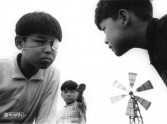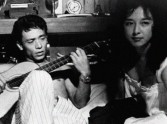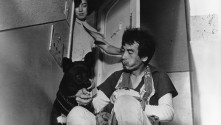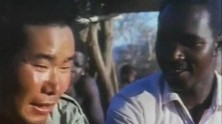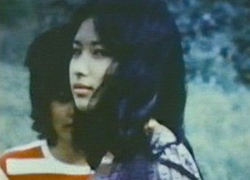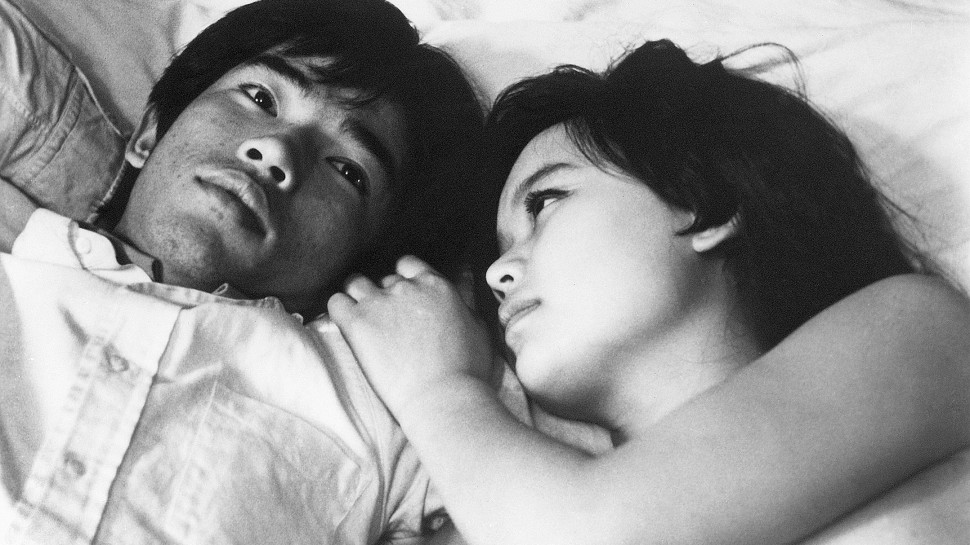
Audio transcription
For more interviews and talks, visit the Harvard Film Archive Visiting Artists Collection page.
Haden Guest 0:02
Good evening ladies and gentlemen. My name is Haden Guest. I'm the director of the Harvard Film Archive and it's an enormous pleasure, a real thrill, to be here tonight to welcome one of the great and visionary artists of postwar Japanese cinema, Mr. Susumu Hani, a filmmaker whose brilliant, daring and unconventional films and career we've been celebrating with a major retrospective that started last weekend and continues through Monday.
Susumu Hani rejected the traditional career path of so many of his contemporaries who followed hierarchical apprenticeships at one of the major Japanese studios and instead began in cinema as a documentarian. He made a series of revelatory short films about children conceived as instructional films and yet films whose lyricism and whose poetic mode of first-person cinema immediately distinguish them and won Mr. Hani international recognition. These were films that were celebrated in Japan and abroad. And these films marked Mr. Hani as one of the most talented emergent new voices of the postwar Japanese cinema, and they lead directly to his first feature films, Bad Boys, which we looked at last weekend from 1961, and the follow-up Children Clasping Hands from the next year, which we're going to see on Monday. These are films that come directly out of the early documentary work and yet extended into really exciting new directions. These are films that use casts of non-professional actors, children whose vulnerability, violent tendencies and resilient grace are captured by the instinctive camerawork and naturalist performances that remain important signatures of Mr. Hani’s cinema. And these are signatures that we're going to see in tonight's film, one of Mr. Hani’s most celebrated and best known works, Nannami: Inferno of First Love, Hatsukoi: Jigoku-hen, which is a moving portrait of awkward young love that offers an enigmatic and at times disquieting vision of a society unhinged by sexual repression and trauma. It's a film that's daringly avant-garde in every sense of the word and it was co-scripted by the legendary poet-playwright and later experimental filmmaker Shuji Terayama.
Mr. Hani’s subsequent career kept him very much in the forefront of Japanese cinema—as you'll see in the film we're going to screen, the rarely screened, late work from 1972 The Morning Schedule, which we're going to look at tomorrow. And then Mr. Hani abruptly left the world of fiction filmmaking to return to documentary and to return to the Africa that he fell in love with during the making of The Song of Bwana Toshi, the marvelous feature that we saw last night. And we're going to be seeing an episode in the celebrated and hugely popular series of nature documentaries that Mr. Hani directed for television, we're going to be seeing one of those tomorrow afternoon in a program of documentaries that includes an early documentary Twins in the Classroom.
In recent years, Mr. Huni’s been extremely busy in his parallel career as a writer, a writer who's been incredibly prolific; he has over a hundred books to his name. And he's been extending the legacy of his father, the renowned historian, Goro Hani and his latest work is a revision and expansion of a meditation on world history called World History Understood in Five Days.
We're absolutely thrilled that Mr. Hani has come all the way from Tokyo to be with us. We're equally honored that he's joined by the lovely Kimiko Nakamura, actress and producer, whose works include The Morning Schedule. This is really a huge honor for us. This program ends at a real high point on Monday when we have a major symposium, and if I'm not mistaken, the first of its kind in the US on the films and extraordinary career of Susumu Hani that takes place one to five on Monday at the Reischauer Institute. We have a number of distinguished historians and film scholars—including our very own Alex Zahlten of Harvard's Department of East Asian Languages and Literatures—but we also have Markus Nornes from the University of Michigan. They're going to be speaking about different aspects of Mr. Hani’s career. This is a symposium that has as its keynote speaker, Mr. Susumu Hani, who's going to be giving a talk titled “What is Cinema for Me.” So this is at Monday at one o'clock.
I want to thank the Reischauer Institute for being such a generous partner on this and supporter of the Harvard Film Archive. Without their support, this program would simply not be possible. I want to thank the Reischauer’s director Theodore Bestor, as well as Executive Director Ted Gilman, but I want to give a very, very special thanks to Ms. Stacie Matsumoto, for her indefatigable support of this program. I also want to thank the Japan Foundation. They gave us a generous grant that made this program possible. And I want to give a special thanks as well to the Consul General of Japan in Boston.
And now with no further ado, I will welcome Mr. Susumu Hani.
[APPLAUSE]
Susumu Hani 6:11
I'm very glad to meet you. Let me explain a little bit about how I made this evening's film. Actually, it’s almost similar: making a documentary film and a feature film. For me, there’s no difference between documentaries and feature films. [Before] the feature film, I made [UNKNOWN] documentaries. But even [UNKNOWN] documentaries, it’s the same as the features and the human documentaries, because most [UNKNOWN] living in Africa, they also think—maybe they think more than you—because they have no society and they have danger or death every day. But they are very much enjoying life. And so they have many, many feelings. And I [heard] very moving stories and funny stories from them. But let’s return to this evening’s film.
Actually, the script is nothing! So, the advertisement said it's co-written with Terayama. We have a very good [friendship], but actually I wrote only two pages [UNKNOWN], and said it was only kind of a premise, and I showed it to Terayama and Terayama said “Very very good. I can write nothing more.” [LAUGHS] But he said, “I’ll actually [?set?] you up for motion picture filming.” Actually the filming was done almost [as quickly as] the movie is going. So I invited Terayama to a day’s shooting. It was inside a very cheap, small, special place where people have sex. It was a very small room. So usually it is constructed for two people, but “two people” means I cannot enter the room, but I entered and I explained to the boy and girl my idea and then I came out of the room and invited my photographer. He's only a photographer, [but] I really think he is a genius. Unfortunately, [Okumura Yuji] died last year. He is much younger than me and he also has a very big body! [I was afraid he couldn’t fit] inside that small room! [LAUGHS] My idea was that he do the scene continuously, one shot with no cut. So he has to move around in that room. He said, “It's alright I can do it.” And then we get out of the room. About three or four minutes or so, Okumura actually came out of the room. He is smiling a little. So I entered and I saw the boy and the girl. No conversation, but [between them, there was] a very strong passion. I felt the passion. So, I thought “This picture will go quite well.” Actually my shooting is [UNKNOWN] and basically only one shot means [I don’t shoot multiple takes], because I want to film– It’s not to record people's action. I want to film the ideas they have inside their minds. Of course, it is quite difficult because usually they do not express their ideas or are not even [?aware of?] their ideas. But I like to [relay] some special moment for them and for me. So suddenly that moment comes and our camera must photograph that moment, because in a very short time, the expression of the idea will go out, and we cannot film it. But after finishing this first day’s filming, Terayama asked me permission to see the rushes of that day’s filming and Teryama had a lot of experience with films. He was excited and said “It was a completely new experience I had.” And after this film was completed, one critic saw the picture and he thought, “This is a travelogue—a mind travelogue—between a boy and a girl. Dark, very strange, but all natural.” I liked his comment. I hope you will see the film by your own [perspective] or your sense. If you can find something in coordination with the acting, I’ll be very happy. Thank you very much.
[APPLAUSE]
Haden Guest 16:58
Please turn off any cell phones or electronic devices that you have on you and keep them off during the screening. We'll be back afterwards after the film is over for a conversation with Susumu Hani, so don't go away. Thank you.
----------------------------------------------------------
David Pendleton
Please welcome Mr. Susumu Hani!
[APPLAUSE]
Haden Guest
Thank you so much for sharing this incredible film with us. There's so much to talk about. And I wanted to start by asking you about the sound. It seems like the sound is so unusual in this film, the way which sound is layered—you have the sounds of the radio, of the water, and then also the music of Toru Takemitsu and I'm wondering if you could just talk a bit about the design, the concept of the sound, because it seems to me one way of thinking about it has to do with this whole confusion between the real and the thought, between the dream and the waking moment. And so, I was wondering if you wanted to talk about that a little.
Susumu Hani 18:15
For this film, I myself did the sound direction. I used many, many songs popular at that time. And of course, I bought those songs and I [?touched them up in places?] and also I used the [complete] opposite to those songs; I used Takemitsu’s music, and it was made for my other film called Bad Boys. And also, I used music created by—probably you know his name—Yashiro Akio. He died very young, but he is quite known in Europe and Japan. And also that music was originally created for my film Horyuji. And so I got permission from him, but I chopped it apart in several places. And I think that Yashiro’s music and also Takemitsu’s music are very, very effective.
Haden Guest 20:04
But what was guiding the sound design then? What sort of concept did you have as you were working with the sound? Was there a particular concept that you wanted to make this, at times, very aggressive sound?
Susumu Hani 20:27
First of all, I'm eighty-four years old. And also, I’m a stutterer. So I stutter in Japanese and also in English, so if you don't understand what I'm saying please say so!
I don't usually direct the sound by my [script] because actually my whole concept is that—yeah, maybe I’ll explain. When I was a baby, my first understandable [word] to other people was “Jun.” Jun was the name of a dog. He lived in the house next door. Usually babies start with “mother” or “father” or “daddy” or “mommy.” But I used Jun not only for the dog, but I also used Jun for the [UNKNOWN] who [greatly] impressed me. I used the word jun. So I think human beings start as very natural [INAUDIBLE] with touching and those things. Then we enter the second stage using the word. But that word was [taught] by other people, so it means if you are very much looking to the father, so someone comes: “Daddy, daddy!” and so it’s repeated. And you say it means education. But before education starts, probably baby me is trying to create something in my head. And actually, you may think it's very strange, but I think people of a very ancient time and civilization, some people create that kind of concept, build concepts by the sound surrounding them, because at that time to live in the ancient world, human beings were a very small population and a very weak population. They have to survive [by] that kind of thing. So understanding language is also quite important, but it's not [primary]. In the past, some people—before speech or understandable language—intensively understood just sound, natural sound or other animals’ voices around [them] and tried to organize–. [It was] the beginning of organizing the word. And maybe that is a very [UNKNOWN] behind [UNKNOWN] ancient people maybe. [LAUGHS] So, I am not giving the word, like you said, strong [emphasis]. I try to communicate without language, to [find] what kind of sound I want. So, some popular songs are very strong, but very short. And Yashiro’s original music, I tried to use it [frequently], but not so strongly. Do you understand?
Haden Guest 26:37
Absolutely. No, it's a brilliant, brilliant soundtrack. And I think this is one of the [aspects] that marks this film as such an avant-garde film—which brings me back to the subject of Terayama. I know you said at the beginning that he was just there really to respond to your poetry, but there's certain imagery and certain ideas in this film that are explored in other Terayama films and that scene of the boys with the masks and they're naked, then it turns into the photographs. I'm wondering scenes like this, did Terayama have involvement with anything else in the film or...?
Susumu Hani 27:25
Yeah, yeah. Terayama is one of very few friends of mine. In some [?official?] doublespeech meeting he said, “So, this gentleman is the most clever person among us. He’ll probably be the finance minister this year, but he has a [serious] language problem. So happily, he is helping us.” And so I looked up at him and he said, “Your [?accent?] is too Korean. And it's not like the same man; [you speak] in a very kind of twisted way, but how you write, it's so simple and direct.” [LAUGHS]
So after he had several impressions from this film, he tried to make some films and actually at that time, Terayama was very, very popular. Even some French company gave him some money. He made several films. Of course, he is a Japanese man also.
Also, most Japanese critics thought the dark part of this “mind travelogue” might be created by Terayama. And we never [UNKNOWN], but actually I made all of that part by myself, and Terayama was very much surprised by and interested in for instance, the women fighting scenes, and he tried to get more knowledge [from] me so I gave some books to him and he used those kinds of scenes in his movies later.
Haden Guest 30:58
Well, that's fascinating. And, so much, you can see, comes from this film in Terayama’s work.
I mean, so children are one of the most important subjects in your early films and with this film you return to the larger subject of childhood, of children, but it is in fact something that that was very different from the rest of your work because you're dealing with these questions of sexuality and this strange and perverse relationship with his foster father and with the mother as well. I was wondering if you could talk about what led you to this subject of ambiguous sexuality and children and how the film was received from this dimension in Japan.
Susumu Hani 31:51
Actually a sense of sexuality always exists in very [young] children. I met several children that had that kind of experience at five-years-old or something like that. And also making a children's film, some parts are not sexual for you but for children, it seems it is something exciting for their body. Of course, when I made the film, I was very, very young. I met those children [?through Nanami’s?] film company. And I was the youngest one to incorporate [UNKNOWN] for a filmmaker at the beginning of the Nanami film.
But there's an old man, Mr. [Keiji] Yoshino. He understood me very well! I was quite surprised when I first met him. Mr. Yoshino is very well known in Japan. He started as a cameraman [UNKNOWN] Japanese comedians, I think 1920 or something. Very old, the silent period. So, he started with that, but in a past meeting he mentioned to me that he wanted to buy an Arriflex camera. But he was also surprised, because I knew the name of the Arriflex camera, because during the Nanami film, I was a newspaper journalist. So a newspaper journalist was the most [popular] job at that time. So people thought “He is very crazy because he's doing such a good job, and he went to such a small company,” but Mr. Yoshino understood me very well. And so I could start to film. As a director, I had no experience, and no experience as an assistant director either. My only cinematic job [before that] was the script for Hae no inai machi. You’re showing that.
Haden Guest 36:20
Oh, A Town Without Flies. We’ll see it on Monday, right.
Susumu Hani 36:23
My script is probably, for many people, very strange because it’s a story about people who try to [clean up] a town, but I put in scenes of the flies [?growing from babies?]. But that film was very welcomed by people. It’s an educational film, but to sell to people, but it's the most sold picture in that time. Yeah. So anyway, I forget what the–
Haden Guest 37:25
About sexuality, children’s sexuality, was the question that we started with.
Susumu Hani 37:30
Yes. So when I'm making a children's film, I was given a lot of freedom from Mr. Yoshino, but at that time I was a much quieter gentleman, because I was twenty-three or twenty-four. So I had never showed apparently, the children’s sexuality–
Haden Guest 38:16
Right, in the early documentaries, right.
Susumu Hani 38:18
But making this film, I was already in my thirties. Yeah. This was my own production. So Mr. Yoshino had already died and [INAUDIBLE]. So I got more freedom to express.
Haden Guest 38:46
I'd love to talk about that scene—that critical scene—where Shun is with Momi in the park, where he's accused of molesting the girl. And the way you edit that scene, it's open. And it strikes me—I've seen it a few times—that you're also asking the audience, “What do you think? Are you the perspective of the adults who accuse and who don't understand this, or are you…?” You know, the way it's open. I was wondering if you could talk about that moment in the film. It's so important.
Susumu Hani 39:23
That sequence that’s [one of] the most quick photographic scenes—so people [argue] very much [about it]—is a dear one.
Haden Guest
What happened, right.
Susumu Hani
They thought that [they] must accuse [him of things that happened that they never saw], so I think that's the problem: you never saw the things but you think, “I already saw it.” I'm sorry, I always think that politicians always say certain religious people [UNKNOWN]. What evidence [is there proving] they saw what they saw? “I saw [UNKNOWN].” [LAUGHS]
Haden Guest 40:45
Let's see if we have questions from the audience and if you have a question, I'll ask you just to speak slowly and clearly. Are there any questions for Susumu Hani? Let's see…. I mean, if not, I can continue. Actually, we have one right here. If you'll wait for the microphone which is coming. Yes, please.
Audience 1 41:15
I have a question about the sexual scenes. I have a question about the women fighting naked part. Was that kind of real in Japan at that time, or was it just totally created for the film? Thank you.
[TRANSLATOR TRANSLATES QUESTION FOR MR. HANI]
Susumu Hani 41:56
No, no, no. That was made by special– Professional people do that kind of– It looks like a festival, but it is more of a managed business. Well, firstly, it is not very widely done in Japan because it's very expensive, so someone has to pay a lot of money to hire– Actually they think that they are hired; some of them [?were known painters?]—that also included that kind of group, so maybe they are not doing it for the money—but anyway they did that kind of a thing because at the time, the United States had huge cigarette [?hyping?], girls fighting...
Haden Guest
Like Bettie Page and…
Susumu Hani 43:51
So they were very select people in Tokyo, [UNKNOWN] Malaysia [UNKNOWN], and they do that. Actually, I showed only a part of what they were doing. That alright?
Haden Guest 44:19
These were professionals then?
Susumu Hani 44:22
They were not professionals. As I said, some of them are painters, but they're doing the things for the money—[a lot of] money. Rich people can pay that money but they insist, “This is not professional. I’m doing it as a hobby.” I don't know the truth, so I followed their judgment.
Haden Guest 45:05
Were there other questions? Yes, we have one right in the middle.
Audience 2 45:11
You mentioned in the introduction that you prefer to work without rehearsal and that many of the scenes between the actors are done on the first take, or without very many multiple takes. I was wondering about the scene in which Nanami tells Shun the answer to the riddle, and if that was shot on the first take, because his laughter in that scene is such a huge contrast to the references to laughter in the rest of the film. And the laughter school and the forced laughter. And when it finally comes out of him in that scene, it's so natural. I'm wondering if that happened on the first take in when you filmed it.
[TRANSLATOR TRANSLATES QUESTION FOR MR. HANI]
Susumu Hani 46:06
No, [prompting] for [any of] the scenes. So in some parts, maybe Shun is very [natural], or very hesitant. But nobody ordered him; he himself had that kind of response to Nanami. Is that all right?
Audience 2
Yes, it was very organic.
Haden Guest 47:39
Actually, I wanted to ask about a scene that to me… You spoke about the idea of documentary and this film, and there's a scene where I think he's the ramen seller who takes off his clothes in the street. And it seems like you just put the camera down—it’s even sort of crooked—and just let it run. And I was wondering, can you tell us about that? Those are the real policemen who come at the end, correct? And was this something then you had...?
Susumu Hani
Yeah, I think that that kind of a– They call it a “happening show” or something...
Haden Guest
Like a happening.
Susumu Hani 48:19
Quite often, we saw that kind of thing in Tokyo. [LAUGHS]
[LAUGHTER]
Haden Guest 48:25
Street theater, yes, exactly. So this was actually happening and you filmed it?
Susumu Hani
Yes, yes.
Haden Guests
Wow. [LAUGHS]
Other questions? We've got one in the back and then we'll get you up front. Hold your hand up in the back. There was a hand... or not. Okay, nevermind, then up here in front. Actually, then everybody can hear you if you speak in the mic, thanks.
Audience 3 48:55
Thanks. How old were the actors playing Momi, Nanami and Shun, and what kind of experience had they had acting? And then also I know today we're watching this movie, but I heard that you had shown Children Who Draw and Children in the Classroom years later to the children who were in that film and wanted to ask if you had anything to say about their reaction to that.
Susumi Hani 50:09
Shun, the boy, was, I think, sixteen or seventeen and he had no experience acting. I saw him because he [?was?] in central Tokyo at some office building there. I met some people who used that office and I met him [going down the staircase], and I had a very strong intuition [about] him. So I slowly watched where he went, and I waited and he came back and I said, “May I have some tea with you?” And so I asked him: “I'm making a film and I want you to [be in] a very important role.” He was quite surprised, of course! [LAUGHTER] But maybe two days later, he came to me: “I accept.”
And so Nanami was probably one year older than Shun, and I selected her because the filmmaking was already announced and it was so small, [we had] a [screen] test to meet several people and she came to the test. And after this film, she joined some Japanese experimental, theatrical group. So maybe she had had a few experiences, maybe only in school theater.
Audience 3
What about Momi?
Susumu Hani
Hmmm?
Haden Guest 53:04
Oh, Momi...
Susumu Hani
Momi, I think, was two or three years old. And I knew her very well. I cheated a little bit, because it's only play. So I had to finish the filming very [quickly] because otherwise, she would resist me. [LAUGHS] So it was [?amazing?] we got the [?shot?], and I think it is alright.
Haden Guest
I wanted to ask about the film within a film, the student film that's made. I was wondering if you could tell us about the eight-millimeter film we see in the student club. Is it true that that actually was made by students?
Susumu Hani
One time, I was on the jury for a student film [contest], almost a very perfunctory job. And I saw that film and I think it was a great fit to the purpose. But the contest was a very small one, and the boy who made that film then came to the place, so, I got his phone [number], and I telephoned him and he said, “Yes, you can, but I am a bit busy in high school, so you must go and wait on the platform, on the very busy day, wait at the train station.” He had to change trains, so I stood there, and he came and gave it to me: “This is the film! I'm very busy!” [LAUGHS]
Haden Guest
Did he continue to make films? [LAUGHS]
Susumu Hani 56:01
I sent an invitation to him, but he never came.
Haden Guest 56:08
[LAUGHS] He’s still too busy.
[LAUGHTER]
Susumu Hani
He completely lost interest.
Haden Guest
There’s a question right here, yes.
Audience 4 56:18
Hi. I was just wondering, looking at your film, it really reminded me of a lot of the Provoke Era photographers like Daido Moriyama and all those people, and I was just wondering if you were influenced by their photography, or was there sort of a cross-pollination with those photographers? Was there sort of a dialogue? Like, I'm thinking of a book like Toshi-e or you know, a lot of Moriyama’s books and I'm just wondering it you sort of saw them and…?
[TRANSLATOR TRANSLATES QUESTION]
Susumu Hani 57:11
I know Mr. Moriyama, but he's much younger than me! [LAUGHTER] And we are not friends. We know [each other], but no relationship. And so, I used that in some parts like that girl [?playing a game with?] Shun, asking him and the girl, small girl. I think that is the same as some of Terayama’s [?stage blocking?].
Haden Guest 58:19
But it's a great question because you actually do use– I would love to know about the actual use of photographs or photograph-like images in the film where you actually freeze–
Susumu Hani 58:30
Ah! Yes, that photograph is made by Sawa… Sawafuji… I forget. At that time, we were good friends so I asked him to make that kind of photograph. Sawafuji…?
Haden Guest
Okay, a name to look up then.
Susumu Hani 59:02
I’ll ask my wife. [SPEAKS JAPANESE TO WIFE] Ah, yes! Sawatari. He’s a very good photographer. But at the time, I [had no money], even to make this film. While filming this in only four or five days, the last one or two days, I went to several other places—I even traveled to Osaka to give a lecture, and I got a little money for that and paid very little for that photograph. And they were so very cooperative. And actually, the film is [now very important historically]. It [became a] success. So afterward, I could pay them quite good money. [LAUGHS]
Haden Guest 1:00:47
Other questions, comments? Oh, if not, then I think we will thank you so much for being with us. And we welcome you all back tomorrow night for The Morning Schedule and in the afternoon for a wonderful program of documentaries, which is at four o'clock. Thank you.
[APPLAUSE]
©Harvard Film Archive
One of the signature masterworks of the Japanese New Wave, Hani's intense and brilliantly unpredictable portrait of youth engulfed in amorous flames is a showcase for Hani's innovative documentary approach to cinema and his rare sensitivity to the fluttering dream of adolescence. The story of a shy young man drawn into the spell of an attractive, outgoing model with a secret life, Nanami: The Inferno of First Love grows increasingly darker and stranger as the girl leads him deeper in the Tokyo underworld and into the troubled recesses of his repressed traumas and fears. While the film's crypto-sexual dreamscape must be partially credited to it's co-writer, the legendary enfant terrible of the Japanese avant-garde, Shuji Terayama, Nanami's intimacy with its young actors and postwar youth culture clearly draws from Hani's earlier work. Shot in grainy 16mm black-and-white Nanami is also a fascinating document of Sixties Tokyo, pulling back the steamy, seedy folds of the same urban underbelly being discovered by photographers like Daido Moriyama and by Hani's contemporary, the avant-garde documentarian Toshio Matsumoto.
Part of film series
Screenings from this program
Children in the Classroom / Children Who Draw
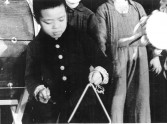
Nanami: The Inferno of First Love
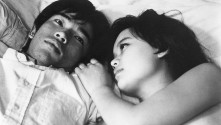
A Town Without Flies / Children Hand in Hand
